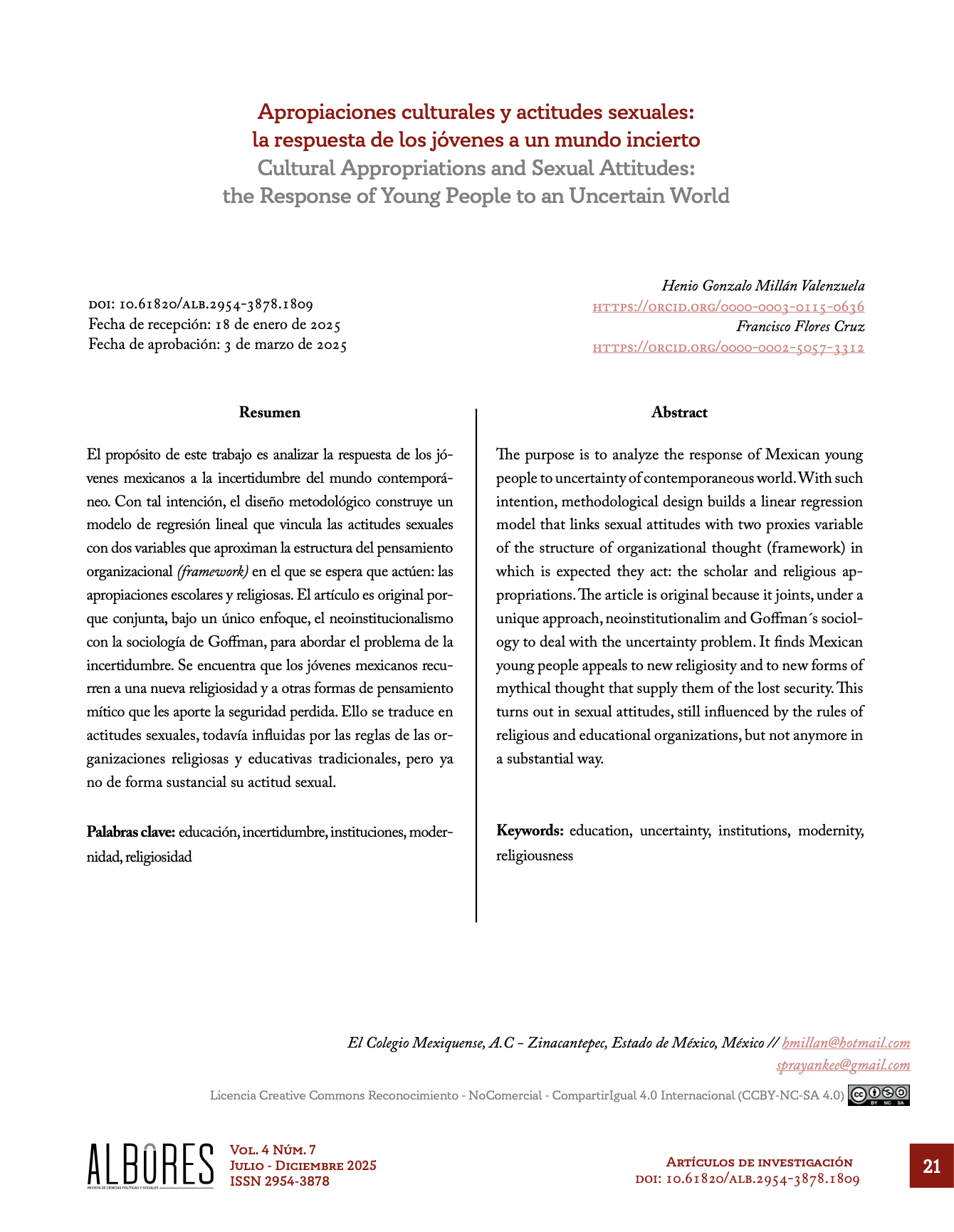Abstract
The purpose is to analyze the response of Mexican young people to uncertainty of contemporaneous world. With such intention, methodological design builds a linear regression model that links sexual attitudes with two proxies variable of the structure of organizational thought (framework) in which is expected they act: the scholar and religious appropriations. The article is original because it joints, under a unique approach, neoinstitutionalim and Goffman´s sociology to deal with the uncertainty problem. It finds Mexican young people appeals to new religiosity and to new forms of mythical thought that supply them of the lost security.References
Abbagnano, N. y Visalberghi, A. (1964). Historia de la pedagogía. Fondo de Cultura Económica. Bauman, Z. (2006). La modernidad líquida. Fondo de Cultura Económica
Beck, U. (1986). La sociedad del Riesgo. Hacia una nueva modernidad. Paidos Ibérica
Böhme, G. (2002). A fourth basic cultural competence?, The Canadian journal of sociology, 27(2), pp. 199-210. http://www.jstor.org/stable/3341711, (Consulta: 15/03/2019).
Consejo Nacional de Población (Conapo). (s.f.). Anticoncepción en mujeres en edad fértil. Conapo. http://www.conapo.gob.mx/work/models/CONAPO/Resource/216/1/images/4Anticoncepcionen.pdf, (Consulta: 27/08/2019).
De Azevedo, F. (1942). Sociología de la educación. Fondo de Cultura Económica.
Durkheim, E. (1956). Education and sociology. The Free Press.
Durkheim, E. (1995). The elementary forms of religious life. The Free Press.
Eliade, M. (1973). Mito y realidad. Guadarrama.
Fisher, W.A., White, L.A., Byrne, D. y Kelley, K. (1988). Erotophobia-erotophilia as a dimension of personality, The journal of sex research, 25(1), pp. 123-15. http://web.ebscohost.com/ehost/pdfviewer/pdfviewer?sid=3c357176-911f-4ee1-bc56ad645cf48bf1%40sessionmgr12&vi-d=6&hid=13, (Cosulta: 26/09/2019).
Goffman, E. (1959), The presentation of self in everyday life. Anchor Books.
Goffman, E. (1986). Frame analysis. An essay on the organization of experience. Northeastern University Press.
González, R. (2009), La Internet como espacio de producción de capital social: una reflexión en torno a la idea de comunidad informal de aprendizaje, Revista mexicana de investigación educativa, 14(40), pp. 175-190. Consejo mexicano de investigación educativa.
Instituto Nacional de Estadística, Geografía e Informática (INEGI). (s.f.). Encuesta nacional de ocupación y empleo. http://www.inegi.org.mx/est/contenidos/Proyectos/encuestas/hogares/regulares/enoe/default.aspx, (Consulta: 02/05/2012).
Instituto Nacional de Estadística, Geografía e Informática (INEGI). (s.f.). XI Censo General de Población y Vivienda 1990. http://www.inegi.org.mx/est/contenidos/proyectos/ccpv/cpv1990/default.aspx, (Consulta: 02/12/2019).
Instituto Nacional de Estadística, Geografía e Informática (INEGI). (s.f.). XIII Censo General de Población y Vivienda 2010. http://www3.inegi.org.mx/sistemas/TabuladosBasicos/Default.aspx?-c=27302&s=est, (Consulta: 03/12/2020).
Instituto Nacional de la Juventud. (2011). Encuesta Nacional de Juventud 2010. Resultados generales. http://descargas.poderjoven.org.mx/docs/523de49e/Encuesta%20Nacional%20de%20Juventud%202010%20%20Resultados%20Generales,%2018nov11.pdf, (Consulta: 01/12/2011).
Luhmann, N.(1977). Funzione della religione, en R. Cipriani (2004), Manual de sociología de la religión. Siglo XXI.
Malinowski, B. (1985). Magia, ciencia y religión. Planeta-Agostini.
Marx, C. (1843). La cuestión judía. https://bit.ly/4h3Lf9U
Millán, H. (2012). La democracia secuestrada. Actores sociales y representatividad en México, Perfiles Latinoamericanos, 20(40).
Morrison, T., Ryan, T., Fox, L., McDermott, D. (2008). Canadian University Student’s Perceptions of the Practices that Constitute “Normal” Sexuality for Men and Women, Canadian journal of human sexuality, 17(4), pp. 161-171. https://www.researchgate.net/publication/257921608_Canadian_university_students'_perceptions_of_the_practices_that_constitute_normal_sexuality_for_men_and_women, (Consulta 28/02/2025).
North, D.C. (2001). Instituciones, cambio institucional y desempeño económico. Fondo de Cultura Económica.
Olmedo, P. (2005). Reseña de “Perspectivas teóricas del aprendizaje en contextos informales” de Anderson, D., Lucas, K.B. y Ginns, I.S., Revista Eureka sobre enseñanza y divulgación de las ciencias, 2(1), pp. 111-114. Asociación de profesores amigos de la ciencia, Eureka, España.
Pablo VI. (1968). Humanae Vitae. Encíclica. http://www.vatican.va/holy_father/paul_vi/encyclicals/documents/hf_pvi_enc_25071968_humanae-vitae_sp.html, (Consulta:28/03/2012).
Rockwell, E. (1995). De huellas, barbas y veredas: una historia cotidiana en las escuelas, en E. Rockwell (coord.), La escuela cotidiana, pp. 13-57. Fondo de Cultura Económica.
Rosales López, C. (2009). Aprendizaje formal e informal con medios en Pixel-bit. Revista de medios y educación, 35(julio), pp. 21-32. Universidad de Sevilla, España.
Siebert, B. (2005). Prospects for a cultural-historical psychology of intelligence, Studies in east European thought, 57(3/4), pp. 305-317. http://www.jstor.org/stable/20099919, (Consulta: 15/03/2012).
Simmel, G. (1992). La religione, en Saggi di sociologia della religione, Borla, en R. Cipriani (2004), Manual de sociología de la religión, pp. 158-245. Siglo XXI.
Simmel, G. (2005). El problema religioso. Editorial Prometeo.
Shepsle, K. (2016). Analizar la política. Comportamiento, instituciones y racionalidad. Centro de Investigación y Docencia Económicas (CIDE).
Sombart, W. (1993). El Burgués. Contribución a la historia espiritual del hombre económico moderno. Alianza.

This work is licensed under a Creative Commons Attribution-NonCommercial-ShareAlike 4.0 International License.
Copyright (c) 2025 Albores


